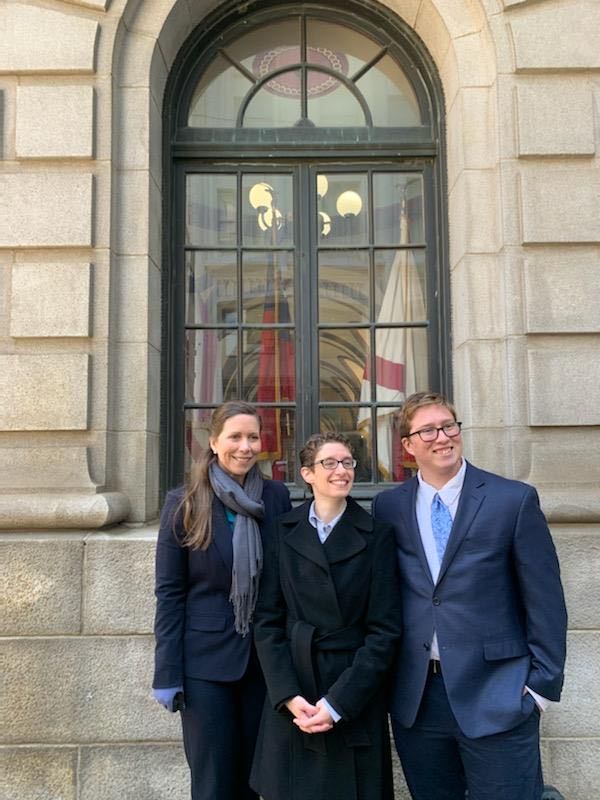US Court of Appeals in Atlanta Considers Bathroom Access For Transgender Student

Drew Adams, right, is seen with his mother, Erica Kasper, left, and attorney Tara Borelli, center. Adams is at the center of a case being decided in the 11th Circuit Court of Appeals in Atlanta.
The United States 11th Circuit Court of Appeals in Atlanta heard oral arguments Tuesday over the country’s first trial involving a transgender student’s equal access to bathrooms.
A three-panel judge heard feuding sides of the Adams vs. The School Board of St. Johns County, Florida, case on whether to uphold a 2018 Florida court order ruling that the school board should allow Drew Adams, a transgender student, to use the boy’s bathroom.
Conservative Circuit Judge Bill Pryor seemed reticent over the Florida court ruling.
“And what about a female student who is tired of using the girls’ bathroom because there’s always a line out the door, whereas that’s never the case with the boys’ bathroom, “Pryor asked to a chuckling courtroom.
A lawyer for St. Johns County asked judges to reverse the Florida ruling and continue the policy restricting students to the bathroom.
“Differences between the sexes are real, and it necessitates this kind of separation between the sexes,” lawyer Jeff Slanker told judges. “This has always been the way it’s been done.”
During a press conference outside the court on Tuesday, Adam’s attorney and Lambda counsel Tara Borelli urged the court to uphold Florida’s court decision, adding that sexual identity is a matter of life and death to many.
“It is important for transgender boys and girls to be able to use the same bathroom spaces as everyone else. They are not trying to eliminate them; they are simply trying to fit in as adolescents at their school, which is so important to adolescents at that point of their lives,” Borelli said.
Borelli said transgender kids just want to be treated “in accordance with their consistently asserted identity.”
“The doctors recognize Drew as a boy, the state of Florida recognizes Drew as a boy, and he simply wants that ability like every other boy at school to simply be the boy or girl that they are without discrimination.”
The case began after Adams, then a high school student at the Allen D. Nease High School in Ponte Vedra, Florida, was told he could no longer use the boy’s bathroom and should use the gender-neutral bathroom instead.
Adams, who is now a university student, said the school’s decision was unnecessarily hurtful and clashed with the culture of his generation.
“By and large, the students don’t really care. Before this became an issue, nobody knew who I was; nobody cared what bathroom I used,” Adams said. “So, this really wasn’t an issue until the school board made it an issue.
“Transgender students are some of the most vulnerable populations. My friends and transgender brothers and sisters are facing homelessness, are being kicking out by their families at home.”
More than two months ago, the U.S. Supreme Court heard arguments for R.G. & G.R. Harris Funeral Homes Inc. v. Equal Employment Opportunity Commission over whether Title VII of the Civil Rights Act of 1964 prohibits discrimination against transgender people.
The court’s decision would affect schools in Florida, Georgia and Alabama and could pave the way for the issue to reach the Supreme Court.








